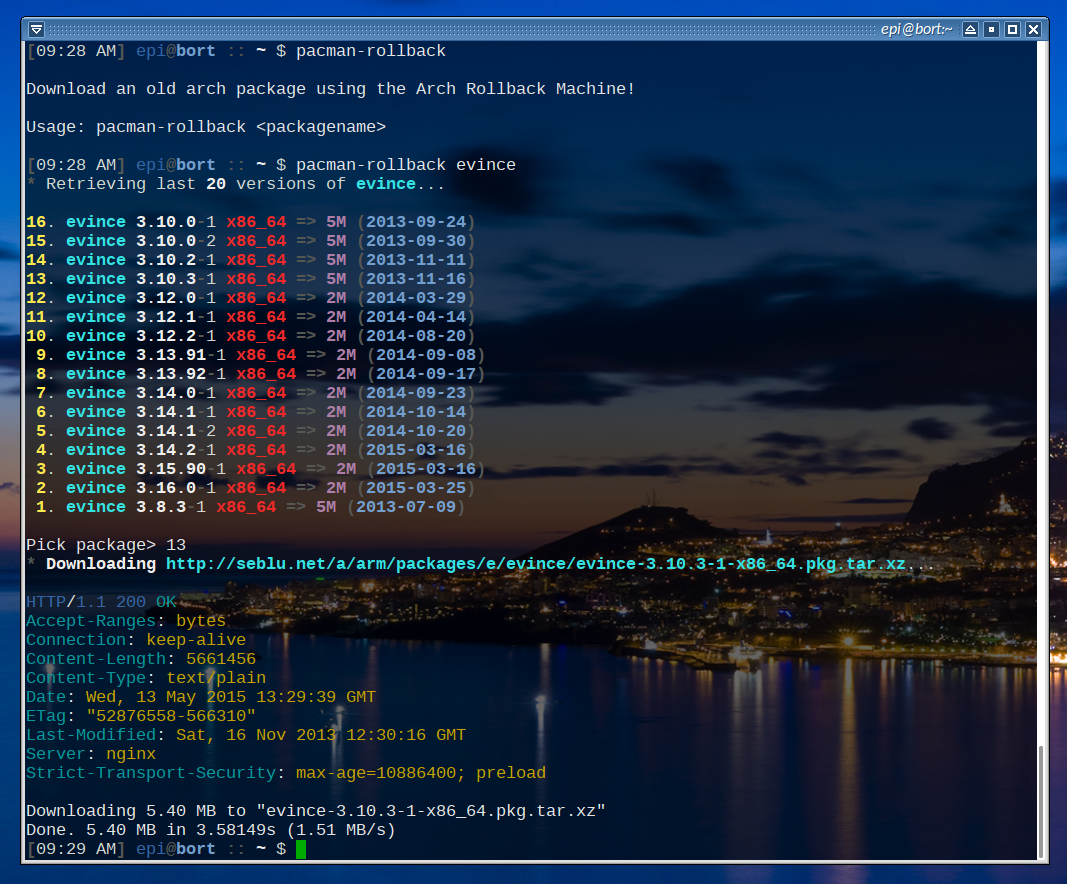README.md in upm-0.1.15 vs README.md in upm-0.1.16
- old
+ new
@@ -1,38 +1,52 @@
# upm: Universal Package Manager
## Concept:
-Wraps all known package managers to provide a consistent and pretty interface, along with advanced features not supported by all tools, such as rollback and pinning.
+Wraps all known package managers to provide a consistent and pretty interface, along with advanced features not supported by all tools, such as:
+- install log
+- rollback
+- pinning
+- fuzzy search
+- containerization/sandboxing
+- learning (community statistics and user choices)
All tools will give you modern, pretty, colourful, piped-to-less output, and you'll only have to remember one consistent set of commands. It'll also prompt you with a text UI whenever faced with ambiguity.
-It will also allow users to maintain lists of their favorite packages (and sync them to some remote server), so that they can automatically install them whenever they setup a new machine. (This can include git repos full of dotfiles/scripts, to give the user a comfortable home environment regardless of which OS they're using.)
+You can maintain lists of your favorite packages (and sync them to some remote server), so that you can automatically install them whenever you setup a new machine. (This can include git repos full of dotfiles/scripts, to give you a comfortable home environment, regardless of which OS you're using.)
+## Installation:
+
+First, install Ruby. Then:
+
+```
+gem install upm
+```
+
## Usage:
```
upm <command> <pkg>
up <command> <pkg>
u <command> <pkg>
```
## Commands:
-* `install`
-* `remove`
+* `install`/`add` - download and install a package
+* `remove`/`uninstall` - remove a previously installed package
* `build` - compile a package from source and install it
* `search` - using the fastest known API or service
* `list` - show all packages, or the contents of a specific package
* `info` - show metadata about a package
* `sync`/`update` - retrieve the latest package list or manifest
* `upgrade` - install new versions of all packages
-* `verfiy` - verify the integrity of installed files
+* `verify` - verify the integrity of installed files
* `audit` - show known vulnerabilities for installed packages
* `pin` - pinning a package means it won't be automatically upgraded
* `rollback` - revert to an earlier version of a package (including its dependencies)
-* `log` - show history of package installs
+* `log` - show history of package installs
* `packagers` - detect installed package managers, and pick which ones upm should wrap
* `sources`/`mirrors` - select remote repositories and mirrors
* `clean` - clear out the local package cache
* `monitor` - ad-hoc package manager for custom installations (like instmon)
* `keys` - keyrings and package authentication
@@ -68,25 +82,27 @@
* FreeBSD: `pkg`/`ports`
* OpenBSD: `pkg_add`/`ports`
* NetBSD: `pkgin`/`ports`
* SmartOS/Illumos: `pkgin`
* Windows: `apt-cyg`/`mingw-get`/`nuget`/`Windows Update`/(as-yet-not-created package manager, "winget")
-* Wine: `winetricks`
+* Wine/Proton/Steam: `winetricks`/`steam`
* Ruby: `rubygems`
* Python: `pip`/`easy_install`
-* Javascript: `npm`
-* Clojure: `leiningen`
-* Java: `gradle`
-* Erlang: `rebar`
-* Scala: `sbt`
+* Javascript/NodeJS: `npm`
* Rust: `cargo`
+* Dart: `pub`
+* go: `go-get`
* R: `cran`
+* Qt: `qpm`
* Lua: `rocks`
* Julia: `Pkg`
* Haskell: `cabal`
+* Clojure: `leiningen`
+* Java: `gradle`
+* Erlang: `rebar`
+* Scala: `sbt`
* Perl: `cpan`
-* go: `go-get`
...[and many more!](https://en.wikipedia.org/wiki/List_of_software_package_management_systems)
## What it might look like:
@@ -101,10 +117,56 @@
Rollback:

+# Future Directions
+
## TODOs:
* Use the pretty text-mode UI that passenger-install uses
* Context-dependent operation
* eg: if you're in a ruby project's directory, set the 'ruby' namespace to highest priority
+
+## Containers, VMs, and Virtual Environments:
+
+Containers, VMs, and Virtual Environments are another pile of tools which do roughly the same thing: they gather together the dependencies for a specific program, or small set of programs, into a bundle, and create an isolated environment in which it can run.
+
+In the future, these could be wrapped by `ucm` (Universal Container Manager), if I get around to it.
+
+### Container tools to wrap:
+
+* Virtual Environments:
+ * Python: `virtualenv`
+ * Ruby: `bundler`
+ * Java: `gradle`
+ * NodeJS: `npm`
+* Containerized Applications/Systems:
+ * AppImage
+ * docker
+ * rkt
+ * snapd
+ * systemd
+ * podman
+ * nanobox
+ * SmartOS zones
+ * BSD jails
+* Wine environments:
+ * wine prefixes
+ * playonlinuxs
+ * proton
+* Virtual Machines:
+ * qemu
+ * virtualbox
+ * VMware
+ * firecracker
+* Hypervisors:
+ * ESXi
+ * Xen
+ * Nova
+
+
+## Similar Projects
+
+* [PackageKit](https://en.wikipedia.org/wiki/PackageKit)
+* [libraries.io](https://libraries.io)
+* [Repology](https://repology.org)